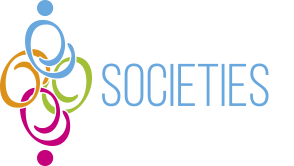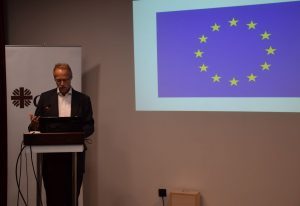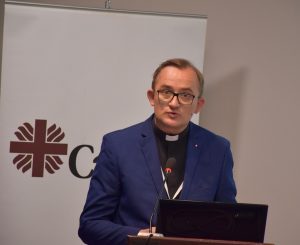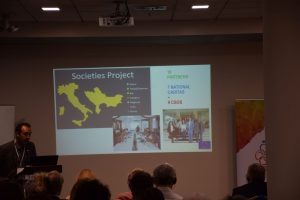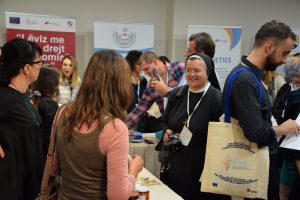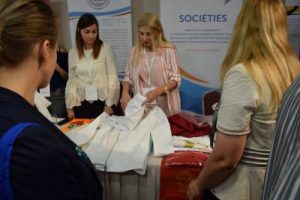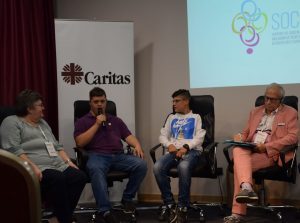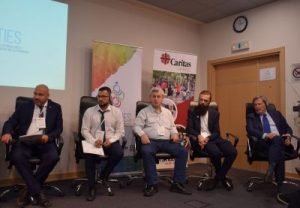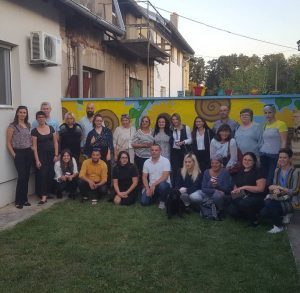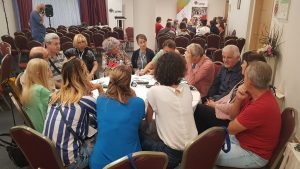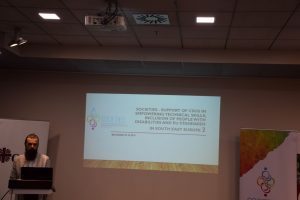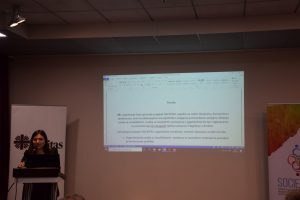The Regional Forum “Social Inclusion of Persons with Disabilities and Persons with Mental Disorders” was held in Belgrade, at Holiday Inn Hotel, on October 1st and 2nd. The Forum was held as part of a regional project SOCIETIES. The project is funded by European Commission and aims to help civil society organizations improve technical skills and contribute to the inclusion of persons with disabilities through the launching and development of social services and social entrepreneurship. The purpose of the Forum was to present the achieved results, to analyze the current situation and to present recommendations for improving the position of persons with disabilities and persons with mental disorders.
At the very beginning, the participants had the opportunity to watch the insert from the interactive performance of the forum theater “Stories from the soul”, which was made up of experiences of psychiatric services users, an shows examples of social exclusion and rejection.
After these scenes that left no one indifferent, the attendees are welcomed by:
- Head of the Sector for Cooperation of the EU Delegation in Serbia, Mr. Ingve Engstrom,
- Head of the Directorate for Health Protection of the Ministry of Health of Montenegro, Mrs. Senka Klikovac,
- Assistant of Minister for Social, Family and Children Welfare in the Ministry of Health and Social Welfare of Republika Srpska, Mr Pavle Paunić
- Caritas Network representative, Mrs. Laura Stoponi
- President of Caritas Serbia, Belgrade Metropolitan and Archbishop Msgr. Stanislav Hocevar
Speakers recognized the difficult economic and social status of persons with disabilities, and especially those with mental disorders, and pointed to the importance of social inclusion of all marginalized groups. Mr Engstom emphasized that solidarity and social inclusion are fundamental principles of the EU and added that Europe is committed to applying it in the region as well.
Director of Caritas Serbia, Rev.Ivica Damjanovic, presented over 80 recommendations for improving social inclusion of persons with disabilities and persons with mental disabilities in the fild of accessibility, combating discrimination and stigma, deinstitutionalization, social and health care services, employment and development of social enterprises, role of civil society organizations, current legislation, the role of family and community in empowering people with disabilities and people with mental disabilities. Participants had the opportunity to get a hard copy of the Recommendation for the Improvement of Social Inclusion of People with Disabilities and Persons with Mental Disabilities. The author of this publication is Snezana Stojanovic, a longtime social worker at the Institute for Mental Health and an associate of Caritas Serbia.
The project results were presented by the project expert, Mr. Etore Fuzaro. He reminded that seven national Caritas are participating in the implementation of the project in cooperation with nine partner organizations. Also, Mr. Fuzaro pointed out that 25 associations or initiatives were supported through the allocation of sub-grants totaling € 450,000, thus empowering over 700 beneficiaries and recalled that the entire project was being carried out for the sake of those people. He added that he hoped that many more initiatives would be supported through similar projects in the future.
Representatives of the sub-grantees had the opportunity to present their initiatives, results, activities and products at the fair, which was organized in the continuation of the program. This was opportunity for representatives of 21 associations of persons with physical, sensory and intellectual disabilities, as well as associations of persons with mental disabilities to exchange experiences and ideas with each other.
During the panel discussion, the participants discussed the implementation of the project, highlighted the lessons learned and provided examples of good practice. The discussion included:
- Dr. Paolo Serra, psychiatrist and consultant at Caritas italiana
- Dr. Nagelo Barbato, psychiatrist and psychotherapist, president of the Psychologists per Popoli nel mondo
- Veselin Joketic from the Association of the Blind for Bar and Ulcinj, Montenegro
- Armand Male from the Center for OSI Drita e Spres, Podgradec, Albania
- Danijela Kegelj, Association of Parents of Children with Special Needs “Vedri osmeh”, Mostar, Bosnia and Herzegovina
- Miroslav Valenta, Caritas of Bosnia and Herzegovina
- Danijel Vranešević and Aniko Jovanović, Association “Zajedno”, Subotica, Serbia
The panel discussion sent the message that it is necessary to invest in people, educate professionals, achieve closer cooperation of associations and state institutions to provide people with disabilities and mental disorders with a life worth living. Still, the strongest impression from the panel discussion was left by Daniel, who has Down syndrome and Aniko, who suffers from mental disorders. The two explained how they participate in the production of briquettes and pellets and how much it means to them.
“Everyone who has been deprived of work capacity should not give up, but should work,” Aniko said.
“I was brought up to be hardworking, nice and well-mannered. My parents invested a lot in me. I want to be useful and to pay tribute to their work, ”said Daniel, causing a loud applause from everyone present. Daniel added that nothing, not even the law, can stop them from working!
After the discussion, the participants visited the “Here’s the Hand” association. Ana Knezevic, the president of the association, introduced the guests to the work of the association and the problems faced by persons with intellectual disabilities in Serbia.
On the second day of the Forum, Dr. Vesna Knjeginjic, Assistant of Minister of Health in the Government of the Republic of Serbia, welcomed the attendees, emphasizing the importance of social inclusion, as well as Serbia’s commitment to the inclusion of all marginalized groups in society.
Group work followed. Groups were formed by countries. Participants identified and presented specific recommendations and activities that will be a priority for action in the coming period. A special group was made up of the directors of national Caritas, who made a statement on the occasion.
In the continuation of the program, the coordinator of the SOCIETIES project for Bosnia and Herzegovina, Mr. Miroslav Valenta, presented the project proposal popularly called SOCITIES 2, which was made on the basis of experience and lessons learned in the previous period. Mr. Valenta explained that the proposal for this project had been submitted to the European Commission as part of a competition to strengthen civil society organizations and received positive evaluations in the first phase. The final decision of the European Commission is expected at the end of October this year.
Ms. Marina Kostic, Coordinator of the SOCIETIES project in Serbia, presented the Charter of Commitment to the SOCIETIES Project Goals. By signing the Charter, all participants of the Forum have pledged to continue to promote social inclusion of persons with disabilities and persons with mental disabilities in the future and advocate for changes that will enable their full inclusion in society.
Director of Caritas Serbia, Rev. Ivica Damjanovic thanked everyone who participated in the project and who supported it and closed the Forum by saying: “Let’s continue to change the world”!
